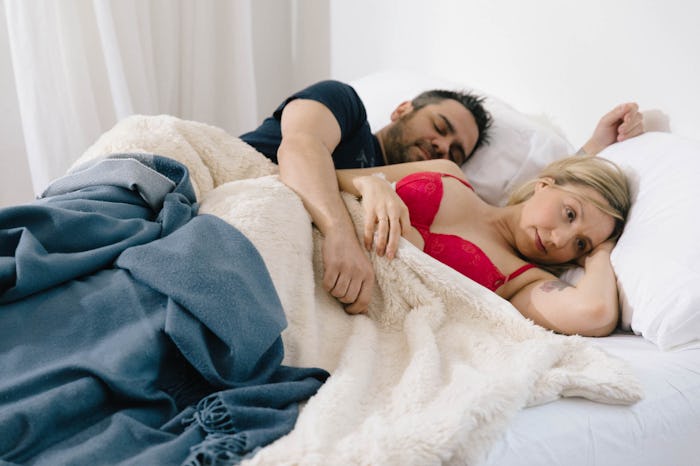Life
How To Get Your Libido Back Naturally, According To An Expert
For many new parents, myself included, finding the time, energy, and desire to have sex can be a challenge. And since asking your doctor about sex isn't always easy, and for many can feel uncomfortable and embarrassing, it can be difficult to improve your post-kid sex life. Thankfully, if you're wondering how to get your libido back naturally, and perhaps without having a potentially awkward conversation with your OB-GYN, there are things you and your partner can do at home to try and rectify the situation in the bedroom.
A 2018 study of postpartum sexuality, published in the journal BMC Pregnancy Childbirth, found that almost half of the 832 first-time mom participants reported a lack of sexual desire, 43 percent reported vaginal dryness, and 37.5 percent reported dyspareunia (pain during sex) six months after after giving birth. The same study found that factors like physical trauma, sexual pain, and breastfeeding can impact your sexual desire.
To find out more about how to boost your libido after having babies, Romper spoke with Dr. Erica Steele, a doctor of naturopathic and complementary medicine and founder of Holistic Family Practice in Virginia Beach, Virginia, who specializes in offering a holistic approach to health care for women and families.
Steele advises new moms to take things slow and give their bodies time to heal. "In our culture we put too much pressure on ourselves and our bodies too soon after having babies," she tells Romper via phone. "Women might not prepare for pregnancy, might have difficult pregnancies, or might have traumatic births. Whatever state you were in before pregnancy gets magnified in the recovery period, and it's important that you take things slow."
So often we want a quick fix, or something to take, but instead, the real focus should be on changing your mindset and allowing yourself to really heal and get back where you need to be.
The need to give your body, and your mind, time is compounded by childbirth, as well as the hormone changes and physical changes that come with it, which can all add up to feeling decidedly unsexy. "You can't force it, nor should you be expected to. I think many women feel ashamed about their bodies after childbirth," Dr. Steele says. "It's culturally driven. Instantly, I'm supposed to bounce back, be a size 2, feel sexy, and ready to go. That's not what happens."
She notes that, unfortunately, our partners who didn't experience childbirth don't always understand the healing process, and that can also lead to a loss of libido. A 2012 study conducted by researchers at the University of Michigan, meant to investigate the potential variables that impact postpartum sexuality, found, not surprisingly, that a variety of social factors, including a lack of support from a partner, can impact a postpartum woman's desire to have postpartum sex.
So, what can you do? Dr. Steele explains that the process necessary to recover after birth, and get that libido back, starts with recovery. "Everything is connected — body, mind, and spirit — so I take a multifaceted approach," she says. Dr. Steele recommends that first people slow down and make sure they are physically healed, well-rested, and feel up to sex. "I recommend self care first," she adds. "If you are tired and not feeling it, you won't enjoy sex, and we don't want that."
As for physical causes of loss of libido, Dr. Steele says hormones might be to blame. "I sometimes recommend hormone testing," she says. "If you are unable to relax or feeling stressed out, your adrenal glands will produce cortisol, sometimes to the extent that they draw progesterone out of the body, which can lead to vaginal dryness and loss of libido."
Because having a baby can drastically change your relationship with your partner, Steele suggests activities to re-build the bond and intimacy within your relationship. Something simple, like date nights and other activities that encourage connection, can boost your mood and, as a result, your libido.
As for herbal supplements or essential oils, Steele prefers to recommend a different approach. "We've got to stop being so hard on ourselves," she says. "So often we want a quick fix, or something to take, but instead, the real focus should be on changing your mindset and allowing yourself to really heal and get back where you need to be."
This article was originally published on
